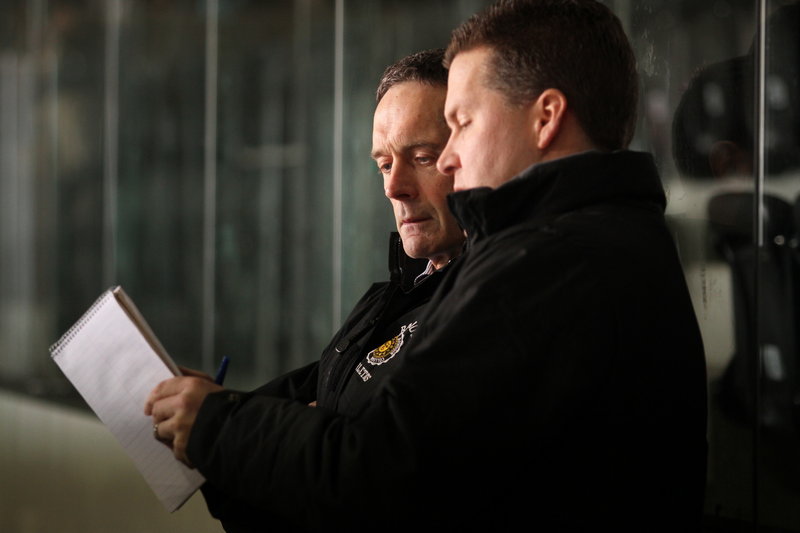BRUNSWICK — One by one, Terry Meagher listened to the eight men sitting in a semicircle. The weekly meeting of Bowdoin College’s hockey leadership council was in session. The afternoon’s important question?
Who starts in goal when Bowdoin plays UMass-Dartmouth in the first game of the NCAA Division III tournament Wednesday night? Steve Messina, a junior, and Max Fenkell, a sophomore, alternated in net throughout this 22-win season, the most since 1984-85.
No one sitting in the semicircle can pass the buck by opting out or simply saying they agree. Meagher can study the statistics but he prizes information, even if it is opinion. Then it’s one man, one vote. Meagher smiles. No, he says, there are no secret ballots.
Typically the majority carries the question. Meagher, pronounced Muh-HAR, smiles again. “I am the head coach. Ultimately I’m responsible. I can overrule the decision.”
No, it’s not really a king and his court. “I treat it like a boardroom. I challenge what I hear. Do you really believe what you just said or are you just throwing it against the wall, seeing if it would stick?”
Assistant coach Jamie Dumont and the team’s two captains are part of the council. So are five other players elected by their teammates. Each season there’s a new vote.
“I didn’t reinvent the wheel,” said Meagher of his idea. “But I don’t think a lot of coaches do this. Some see themselves as authoritarians in that old-school way. They wouldn’t agree with this. They think it’s made my job easier because the players are doing the work. It’s harder because it makes more work for me.”
He was a Canadian farm boy, the oldest of nine children who made sure they were home for dinner on time. He can still feel the weight of hay bales, the rhythm of wielding a shovel and the brute strength of a jackhammer in his hands. He played hockey for Jack Parker at Boston University, graduating in 1976.
He’s been the head coach at Bowdoin for 30 years with a record that sits on 497 victories. He’ll hit 500 by reaching the NCAA championship game. Not that Meagher wants to talk about that.
Coaching 500 winning games – he has 227 losses and 49 ties – can indicate his age, although he’s not yet 60. In some ways he’s still a boy asking questions, wanting to know more.
He loves golf and movies directed by John Ford starring John Wayne. He can quote dialogue from “Stagecoach” and “The Searchers,” and does to his team. Knowing that to their 21st-century ears he might as well quote Shakespeare or Dickens.
He believes in his players evaluating their own performances and attitudes, using numbers 1 through 5. He evaluates them and compares the scores. “Usually we’re not more than five points off. Sometimes they score themselves harshly. I make sure we talk.”
Meagher has a reputation for thinking outside the box. Or using the box. He has approached hockey as geometry as he instructs his players in offense and defense. He’s not afraid to change.
He came up with his version of a leadership council six or seven years ago after reading “The Five Dysfunctions of a Team,” written by Patrick Lencioni. The council discussions can hit many topics, some touching on players as individuals. What’s said at the sessions, usually held in the last 20 minutes of practice away from the ice, stays in the group when personalities become the subject.
The council is a work in progress. If it stops working, Meagher will change or scrap it. Tom Coughlin, head coach of the New York Giants, started a council of his football players before the 2007 season. He dropped it about four years later and brought it back last season.
“Tough times and adversity can be gifts,” said Meagher. It’s why we watch movies. To see conflict, see the good guy get knocked down and learn how he’s getting back to his feet.
Last Sunday the leadership council voted that Fenkell should start his second straight game in goal, breaking the rotation. Bowdoin beat Williams 2-1 to win the New England Small College Athletic Conference championship and a place in the NCAA playoffs. Lose and their season is over.
If Fenkell felt pressure, he also felt support. Teammates spoke up for him when it mattered. He got their votes in a most visible way.
Steve Solloway can be contacted at 791-6412 or at: ssolloway@pressherald.com
Twitter: SteveSolloway
Send questions/comments to the editors.



Success. Please wait for the page to reload. If the page does not reload within 5 seconds, please refresh the page.
Enter your email and password to access comments.
Hi, to comment on stories you must . This profile is in addition to your subscription and website login.
Already have a commenting profile? .
Invalid username/password.
Please check your email to confirm and complete your registration.
Only subscribers are eligible to post comments. Please subscribe or login first for digital access. Here’s why.
Use the form below to reset your password. When you've submitted your account email, we will send an email with a reset code.